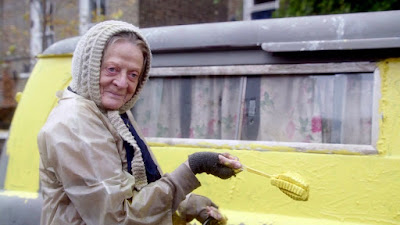or
The Wisdom of the Tribe
Homelessness isn't a new problem. There have always been homeless—some cultures have formalized this as "nomads"—just as there have always been poor. They are almost an integral part of the way industrialized economic systems are set up. Homelessness keeps the middle-class from becoming complacent. But, unfortunately, we should never be complacent about homelessness. They are our canaries in the coal-mine. And unfortunately, the elite fluttering high above the middle class haven't noticed the problem in their complacency. They haven't noticed the RV's on street corners, the crowded parking lots surrounding rural Wal-Marts, they're not checking the canaries. They haven't figured out that part of the issue might be circumstance, but part of it might be revolt. You can't charge property taxes on an SUV.
And there's no practical address to be traced, as well.
Allan Bennett (Alex Jennings) is a successful writer (he was/is, although it's not mentioned he was part of the "Beyond the Fringe" group), just successful enough through his work that he moves out of his Mother's house and into his own little flat, in a posh neighborhood that includes the widow of composer Ralph Vaughan-Williams. She's on the high-end of the scale. On the low-end is Miss Shepherd (Dame Maggie Smith) who is perpetually moving; she has to or the local bobbies will arrest her.
No one knows who Miss Shepherd is, or what her "story" is, but she's something of a blight, her van an eyesore—especially as she regularly paints it canary yellow—and attracts bad behavior in juveniles and one particularly nasty detective (Jim Broadbent), who rap on her windows at night and scare the pudding out of her. The neighbors, being mostly British, keep a stiff upper lip and hold their counsel and even do the occasional "turn" for her, especially on Holidays. That "turn" is usually taken with a curt "close the door, you're letting the heat out" and nothing else, but she is still acknowledged by the neighborhood as part of the community (while silently wishing she was part of another).
Her closest relationship is with the writer Bennett, who, out of curiosity and maybe due to some nagging guilt about leaving Mom, regularly interacts with her and, eventually, provides something of a safe haven for her in his courtyard. He also provides regular bathroom facilities for her, which is usually more trouble than it's worth. Bennett is of two minds about Miss Shepherd, but then he is of two minds about everything; he is, after all, a writer, and nothing goes in that doesn't eventually come out (if we want to carry on with the bathroom analogy). There is the Alan Bennett who lives his life and interacts, and then, there is the Alan Bennett who cuisinarts that living and spits out the re-imagining, the re-interpretation, and the re-gurgitation in order to make a living...as a writer.
Bennett can not have one without the other, and The Lady in the Van has it both ways, by splitting Bennett into two personas (both played by Jennings), who regularly interact with each other, both observers—one observing, and the other observing the observer; he's his own worst...and best...critic, constantly questioning, commenting, second-guessing, and passing judgment on that first Bennett. Their conversations make up his own greek chorus and narrative as he simultaneously helps and tries to get "background" on this strange, idiosyncratic person living in his courtyard (provided by him so she doesn't have to keep constantly moving her vehicle per police command).
 |
| "Half" of the Alan Bennett's..."kravitzing" |
What holds the thing together is Dame Maggie Smith. No one can play "dotty" as well as she can without stooping to sentimentality or mawkishness; the character rejects sympathy and Smith sluffs it off her performance like teflon. For every moment of charm, there are twelve where she's an unapologetic royal pain (which, these days, seems to be the way we like her). It's a pleasant movie, more for the blue-rinse set than anyone else, and not altogether unenjoyable.






No comments:
Post a Comment